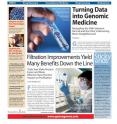GEN co-sponsors roundtable discussion on novel bioremediation techniques
Genetic Engineering & Biotechnology News (GEN) recently co-sponsored a roundtable discussion on new ways to use biological solutions to assist in environment clean-up after manmade or natural disasters. "Gulf Oil Spill: Using Modern-day Biology to Assess the Environmental Impact and to Help in Remediation" was also sponsored by the Venture Development Center (VDC) at The University of Massachusetts Boston, where the discussions took place. Part I of the roundtable appears on the Video Section of the GEN website (http://www.genengnews.com/video-channel) and a link to the entire roundtable presentation is also included on the GEN website Video Section. "The Gulf Oil Spill catastrophe was a clear wake-up call regarding the critical need for faster, more efficient, and more environmentally-friendly clean-up solutions," said John Sterling, Editor in Chief of GEN, who served as co-moderator of the roundtable along with William Brah, Assistant Vice Provost for Research and Executive Director of the VDC. "GEN was honored to work with such a prestigious roundtable panel," added Sterling.
The panel members included John Farrington, UMass Dartmouth & Woods Hole Oceanographic Institute (Emeritus); Olivia Mason, Lawrence Berkeley National Laboratory; Doug Bartlett, Scripps Oceanographic Institute; Juanita Urban-Rich, UMass Boston; and Richard T. Schumacher, Pressure BioSciences, Inc. (NASDAQ:PBIO).
During the roundtable, scientists from academia and industry discussed the effectiveness of biological methods and tools that could help improve the understanding of the marine environment, assess the impact that oil spills of any magnitude have on this complex yet delicate ecosystem, and help monitor the effectiveness and even be part of the clean-up procedure during remediation.
Source: Mary Ann Liebert, Inc./Genetic Engineering News
Other sources
- GEN co-sponsors roundtable discussion on novel bioremediation techniquesfrom Science BlogTue, 7 Dec 2010, 20:10:34 UTC
